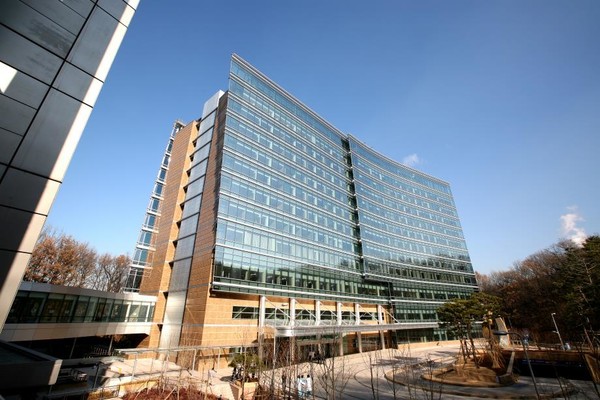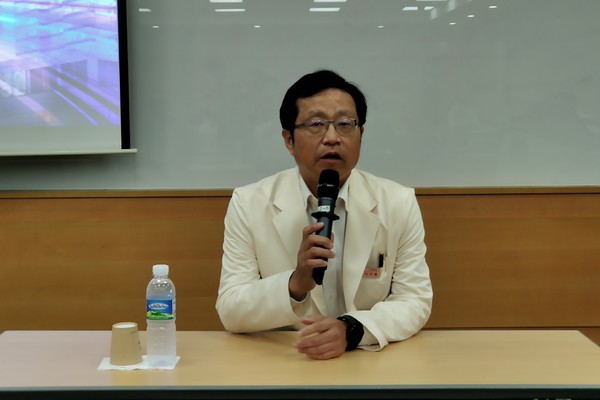SMC Cancer Center to transform itself as ‘growth plate for Bio-R&D’

Samsung Medical Center’s Cancer Center, which ranked sixth place exceeding the U.S. Johns Hopkins Hospital and Japan’s National Cancer Center in the World’s Best Specialized Hospitals, has begun preparations to meet the new bio era.
“Gone are the days when cancer hospitals only treat cancer,” General Director Lee Woo-yong said.
Lee added with confidence that SMC Cancer Center, which boasts unprecedented treatment data worldwide, will emerge as the research and development hub to lead the future era through its research.
SMC Cancer Center, which opened in 2008, treats about 12 percent of new cancer patients in Korea. That means approximately 30,000 patients are receiving treatments at SMC Cancer Center.
According to the Outcome Book published by SMC Cancer Center, in the case of stomach cancer common among Koreans, the five-year survival rate is 87.7 percent, while those for colon, lung, breast, and liver cancer were 84 percent, 50.7 percent, 95.3 percent, and 55.5 percent. These figures surpass even the U.S. in all cancer types, not to mention other domestic hospitals.
In addition, even in the same cancer type, the center showed remarkable strength in "remote metastatic cancer," which is more difficult to treat.
Remote metastatic cancer is a state in which cancer has spread to organs far away from the site where it first occurred. Mainly known as stage-four cancer among cancer patients, it has a small number of treatments and is often difficult to expect an effect even if treated.
Even in remote metastasis pancreatic cancer, a representative refractory cancer among major cancers, the five-year relative survival rate of SMC Cancer Hospital reached 26 percent from 2011 to 2015. The national average is 2 percent. In lung cancer, another incurable cancer, the center’s relative survival rate was 34.7 percent, five times higher than the domestic average of 6.1 percent.
“It proves that the level of cancer treatment in our country has risen a lot,” Lee said/ “After the SMC Cancer Center opened, other institutions followed its example, and the level of cancer treatment in Korea has reached a global level. That shows how much (treatment) benefits Korean people receive.”
Lee added that the hospital staff’s pride has increased, and patients have come to gain the confidence that they are being treated in a really good hospital.

Challenge for SMC Cancer Center is a ‘futuristic cancer hospital’
SMC Cancer Center introduced a proton therapy device in 2016 for the second time in Korea following the National Cancer Center and currently treats nearly 50 patients daily. The number of patient treatments also exceeded 5,000. Head and neck cancer took up the largest share with 21.9 percent, followed by liver cancer’s 18.1 percent, brain tumor’s 17.8 percent, and lung cancer’s 14.7 percent.
This past May, it also opened a multidisciplinary precision cancer treatment center participated in by five or more medical departments, including the Hemato-oncology Department.
Various cutting-edge methods, genomic analysis, and immunotherapy are researched vigorously in cancer research. However, SMC Cancer Center is the first in Korea to set up a precision cancer center based on a multidisciplinary approach centering on actual treatment.
The center plans to lead future cancer medicine, such as next-generation cancer treatment, cancer surgery techniques, and radiation therapy, by comprehensively and precisely analyzing a patient's cancer information, cancer characteristics, blood tests, images of cancer, and specific complications.
Major treatment targets are patients who found mutated genes in genetic tests among metastatic and terminally ill patients who were unable to receive operation or had failed standard treatment. Personalized precision treatment is also possible for solid cancer, leukemia, and other genetic diseases.
The CART-cell Treatment Center, which opened for the first time in Korea in April last year, also shows results in treating patients.
CAR-T (chimeric antigen receptor-T cell) treatment is the next-generation treatment that attaches a kind of navigational device to immune cells to find cancer cells because cancer cells pretend to be normal cells to avoid immune cell attacks. It began to receive insurance benefits in April.
It is mainly used to treat intractable blood cancer patients. However, when recurrence and refractory patients receive CART cell treatment, the complete remission rate reportedly reaches 40-60 percent.
However, there is a structural problem in which the more patients hospitals treat, the larger their deficits get after the treatment begins to receive insurance benefits, forcing hospital managers to worry whether they should continue treatments.
“The deficit is growing as drug prices fall after switching to reimbursement. It’s because patients’ hospitalization prolongs, and there are lots of work to do, but the fees have not been set yet,” Lee said. “It is becoming a big problem in the way leading good treatment. We need to provide optimal treatment receiving optimal fees. However, optimal treatment is impossible with a low level of fees.”
Lee noted that after other hospitals started providing CART-cell therapy and sufficient data is collected, the academic society should discuss the matter with the government. Then, the hospital should be able to offer the proper treatment without concern, but currently, they cannot afford to do so now, he added.
SMC Cancer Center also revealed its ambition to lead the future bio era. That explains why it makes efforts to build a comprehensive cancer data platform to lead the Fourth Industrial Revolution.
To this end, the hospital is unifying EMR forms that have been different from department to department and are streamlining the work process by automatically linking not just test and treatment results but treatment details and enabling a call.
“If we can add one thing to increase treatment survival rate so that patients can receive treatment with ease, it is that the days are long gone when cancer hospitals only treat cancer,” General Director Lee said. “(Cancer hospitals) are transforming into R&D platforms through research. SMC Cancer Center, which has unparalleled data in the world, will become the R&D hub to help biopharmaceutical companies both here and abroad develop (through research).”
Lee added that another mission of SMC Cancer Center is how it should change the structure of cancer hospitals to become transformers as the growth plate for R&D, how to make professors think so, and how to link biopharmaceutical companies to conduct global research through this.
"Through these and other efforts, we will make SMC Cancer Center a global leader in cancer treatment,” Lee stressed.

